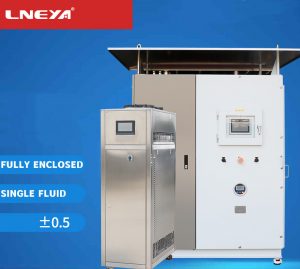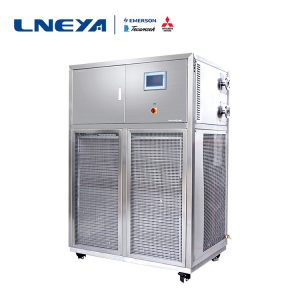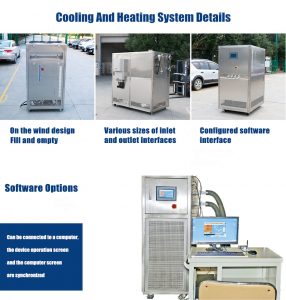Chemical process is inseparable from temperature control
Generally speaking, the temperature of most chemical reactions will start at room temperature and may need to be gradually increased to promote the reaction. Some reactions need to be carried out within a specific temperature range. For example, hydrothermal reactions are often used in pharmaceutical chemistry. The required reaction temperatures are generally relatively high and the reaction times are relatively long.
In some special pharmaceutical processes, such as solid-phase synthesis and liquid-phase synthesis, the reaction temperature may need to be precisely controlled through the use of heaters, thermostats or cooling equipment. For some specific pharmaceutical reactions, such as biological enzyme-catalyzed reactions, temperature control may be more complex and precise.
The high temperature range in the chemical industry is a very important link and needs to be strictly controlled. Reaction temperatures that are too high or too low may lead to out-of-control reactions or poor product quality. During storage and transportation, high temperature environments can easily cause product degradation or deterioration, and may even cause safety accidents. Generally speaking, these reactions need to be carried out at high temperatures above 100°C. For example, some polymerization reactions usually need to be carried out at high temperatures of 150-200°C, while the synthesis of some polymer compounds needs to be carried out at high temperatures above 250°C.
There are 17 types of chemical processes. In order to achieve quality, yield and safety, temperature control is basically indispensable. We at LNEYA have been deeply involved in the pharmaceutical and chemical industry for 16 years. The low-temperature water coolers, high-temperature circulators, and dynamic temperature control systems we produce are widely recognized and used by customers. The cooling and heating equipment uses thermal oil as the medium and the fluid temperature is controlled. The closed cycle uses fluid media to control the constant temperature of the reaction vessel or reaction materials, with high temperature accuracy. The system intelligently records the temperature change curve in real time, which facilitates the operator’s later data summary and analysis, and has established a large number of in-depth cooperative enterprises.
 SUNDI Z Série de conversion de fréquence
SUNDI Z Série de conversion de fréquence
WHATSAPP WECHAT La technologie de refroidissement à ultra-haute température peut refroidir directement à partir d'une température élevée de 300℃ [car seul le fluide caloporteur dans l'expansion...
 SUNDI -10℃~150℃
SUNDI -10℃~150℃
Système entièrement fermé, un seul moyen complète la réfrigération et le chauffage -120~350℃ ±0.5℃ AC 380V 50HZ 8kW max Technologie de refroidissement à ultra haute température peut refroidir directement à partir d'un...
 SUNDI -80℃~250℃
SUNDI -80℃~250℃
● Températures de travail de -120°C à +350°C ● Performances jusqu'alors inatteignables ●Contrôle intelligent de la température ● Stabilité et reproductibilité maximales des processus ● Échangeur de chaleur à plaques Adop, Pipeline heating, the fastest he...
 SUNDI-320/320W
SUNDI-320/320W
Système entièrement fermé, un seul moyen complète la réfrigération et le chauffage -120~350℃ ±0.5℃ Technologie de refroidissement à ultra-haute température Peut directement refroidir à partir de 300℃ haute température. Bec...
 SUNDI -25℃~200℃
SUNDI -25℃~200℃
Système entièrement fermé, un seul fluide complète la réfrigération et le chauffage -120~350℃ ±0,5℃ ● Températures de travail de -120°C à +350°C ● Performances jusqu'alors inatteignables ●Contrôle intelligent de la température....
 SUNDI -45℃~250℃
SUNDI -45℃~250℃
● Températures de travail de -120°C à +350°C ● Performances jusqu'alors inatteignables ●Contrôle intelligent de la température ● Stabilité et reproductibilité maximales des processus ● Échangeur de chaleur à plaques Adop, Pipeline heating, the fastest he...
 SUNDI -60℃~250℃
SUNDI -60℃~250℃
La technologie de refroidissement à ultra haute température peut refroidir directement à partir d'une température élevée de 300℃[car seul le fluide caloporteur dans la chambre d'expansion est en contact avec l'ox...
 SUNDI -80℃~250℃
SUNDI -80℃~250℃
● Températures de travail de -120°C à +350°C ● Performances jusqu'alors inatteignables ●Contrôle intelligent de la température ● Stabilité et reproductibilité maximales des processus ● Échangeur de chaleur à plaques Adop, Pipeline heating, the fastest he...
chargement...
已经是到最后一篇内容了!
Consultation gratuite 7 * 24 et solutions complètes


Courriel : sales@cnzlj.com
WhatsApp : 086 13912479193
Recommandations connexes
-
How to deal with chip failure in integrated circuit chip test?
1212The integrated circuit chip test is used in various chips, semiconductors, and component tests. Once the chip fails, the test work will stop. Therefore, the ineffective user of the integrated circuit chip test needs to know clearly. The purpose of...
Voir les détails -
What if the cooling rate of the cooling and heating temperature control system of the reactor slows
1082LNEYA cooling and heating temperature control system is a laboratory instrument and equipment for temperature control of supporting reactors in pharmaceutical and chemical laboratories and other industries. It adopts a fully closed circulation pip...
Voir les détails -
Throttle component of semiconductor water-cooled temperature control platform
1209The throttling component of the semiconductor water-cooled temperature control platform is one of the four major components that are indispensable for the refrigeration system. Its function is to reduce the pressure of the high-pressure liquid com...
Voir les détails -
Application and function of explosion-proof constant temperature circulation system
991Temperature control in drug research and development and chemical experiments, as well as temperature control in small-scale experimental production and industrial production, all require highly dynamic constant temperature controllers. The chemic...
Voir les détails
 LNEYA Industrial Chillers Fabricant Fournisseur
LNEYA Industrial Chillers Fabricant Fournisseur






















Soumettre à consultation
Nous vous répondrons dans les 24 heures